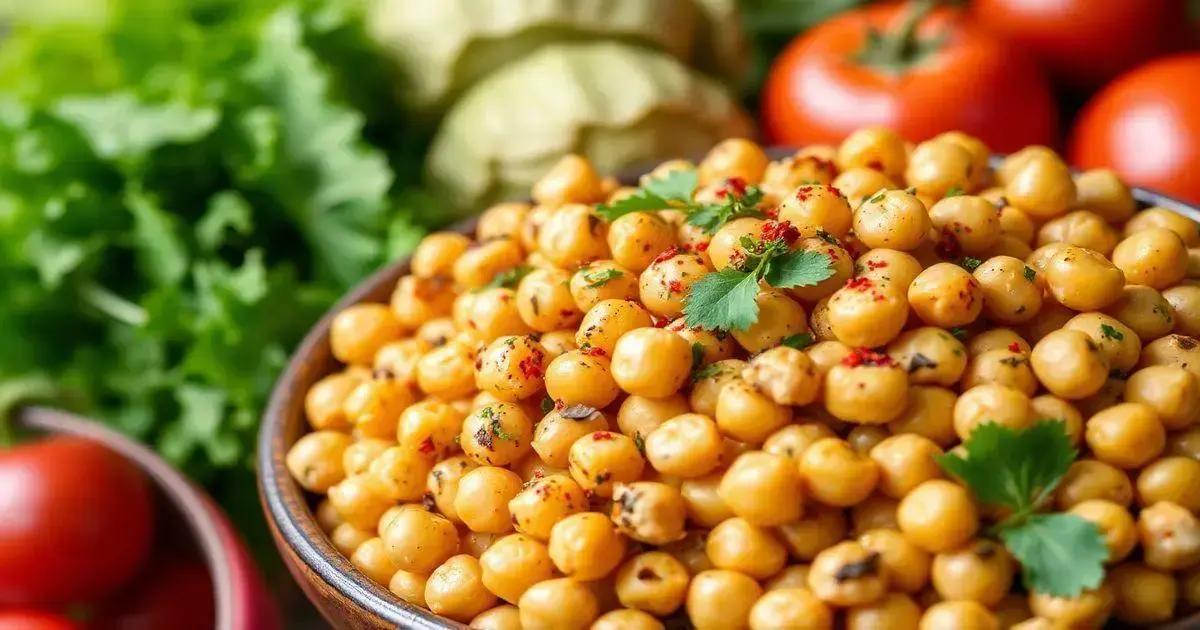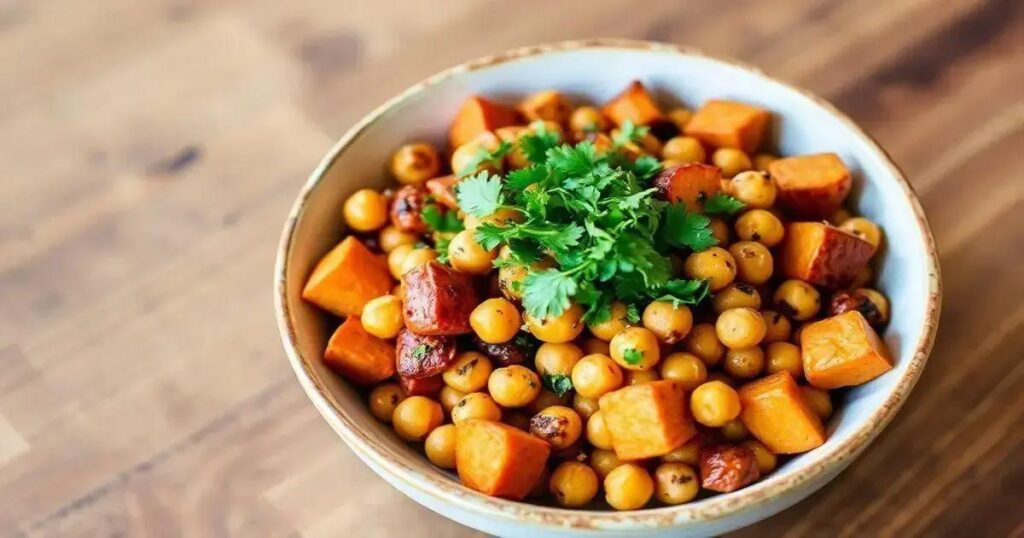Roasted sweet potato and chickpea bowl recipes are nutritious meals that support hormonal health by incorporating whole foods, healthy fats, and balanced macronutrients, while also providing essential vitamins and minerals for optimal hormone balance.
If you’re looking to promote hormonal balance through your diet, roasted sweet potato and chickpea bowl recipes are a delicious way to support your health. These recipes are packed with nutrients that contribute to hormonal harmony, making them ideal for anyone seeking to enhance their well-being. This article highlights the benefits of sweet potatoes and chickpeas in regulating hormones, offers simple recipes to try, and provides tips on how to incorporate these ingredients into your meals for maximum effect.
Benefits of Sweet Potatoes for Hormonal Health

Sweet potatoes are not just a delicious comfort food; they also bring numerous benefits for hormonal health. Rich in vitamins and minerals, these vibrant tubers play a crucial role in maintaining balance within the body.
High in Antioxidants
Sweet potatoes are packed with antioxidants that help combat inflammation. This is important because inflammation can disrupt hormonal balance, leading to various health issues.
Rich in Fiber
These tasty vegetables are high in dietary fiber, which promotes healthy digestion and helps regulate blood sugar levels. Balanced blood sugar is key to hormonal stability, making sweet potatoes an excellent choice for those looking to support their hormonal health.
Supports Thyroid Function
Sweet potatoes contain nutrients like iodine and selenium, both of which are crucial for thyroid health. A well-functioning thyroid helps regulate hormones throughout the body, contributing to overall balance.
Blood Sugar Regulation
With their low glycemic index, sweet potatoes help prevent spikes in blood sugar. This ensures that insulin levels stay steady, which is vital for hormonal balance—especially for those with insulin resistance or hormonal imbalances.
By incorporating roasted sweet potatoes into your meals, you can take advantage of their many benefits. Pairing them with other nutritious ingredients, like chickpeas, can further enhance their positive effects on hormonal health and overall wellness.
Chickpeas: A Powerhouse for Hormone Balance

Chickpeas are often referred to as a powerhouse for hormone balance thanks to their rich nutrient profile. These legumes are not only versatile in cooking but also provide essential nutrients that help regulate hormones in the body.
High in Protein
Chickpeas are an excellent source of plant-based protein, making them an ideal choice for those looking to support hormone production. Amino acids from protein are vital for synthesizing hormones, which can aid in overall hormonal balance.
Rich in Fiber
The high fiber content in chickpeas helps stabilize blood sugar levels. This is important because fluctuations in blood sugar can lead to insulin resistance, which affects hormonal balance. Including fiber-rich chickpeas in your diet can help manage these levels effectively.
Contains Key Vitamins and Minerals
Chickpeas are high in important nutrients like magnesium, zinc, and B vitamins. Magnesium plays a role in over 300 biochemical reactions in the body, including hormone regulation. Zinc supports reproductive health, and B vitamins are essential for energy production and hormonal balance.
Supports Healthy Digestion
By promoting healthy gut bacteria, chickpeas help improve digestion. A healthy gut can influence the production and regulation of hormones, making chickpeas a great addition to a diet focused on hormonal health.
Incorporating chickpeas into your meals, especially alongside roasted sweet potatoes, can create a nourishing bowl that supports hormonal balance and overall well-being. These legumes not only contribute to flavor but also to your body’s hormone health.
Simple Roasted Sweet Potato and Chickpea Recipes

Creating simple roasted sweet potato and chickpea recipes is a great way to enjoy nutritious meals that support hormonal health. Here are a few easy recipes to try.
Basic Roasted Sweet Potatoes and Chickpeas
For a straightforward dish, preheat your oven to 400°F (200°C). Start by peeling and cutting two medium sweet potatoes into cubes. Rinse one can of chickpeas and pat them dry. In a bowl, mix sweet potato cubes and chickpeas with olive oil, salt, pepper, and your favorite herbs like rosemary or thyme.
Spread the mixture on a baking sheet and roast for about 25-30 minutes. Make sure to stir halfway through for even cooking. This simple recipe is not only delicious but also rich in nutrients.
Sweet Potato Chickpea Salad
For a refreshing salad, begin by following the steps above to roast sweet potatoes and chickpeas. Once cooked, let them cool. In a large bowl, combine the roasted sweet potatoes and chickpeas with chopped spinach, diced red onion, and avocado.
For the dressing, whisk together lemon juice, olive oil, salt, and pepper. Toss gently to combine all ingredients. This salad is perfect for a light lunch and is loaded with beneficial nutrients.
Spiced Sweet Potato and Chickpea Bowl
For a flavorful bowl, start by roasting your sweet potatoes and chickpeas as described earlier. While they roast, cook quinoa or brown rice according to package directions.
Once everything is cooked, layer the quinoa or rice at the bottom of a bowl, followed by the roasted sweet potato and chickpeas. Top with a dollop of yogurt or tahini and sprinkle with paprika or chili flakes for extra flavor.
Sweet Potato Chickpea Curry
This dish is easy to prepare and packed with flavor. Start by sautéing onions, garlic, and ginger in a pot. Add diced sweet potatoes, rinsed chickpeas, coconut milk, and curry powder. Let everything simmer until sweet potatoes are tender, about 20 minutes.
Serve the curry over rice for a hearty meal that supports hormonal health. Not only is this dish comforting, but it also provides essential nutrients that contribute to hormonal balance.
Tips for Enhancing Hormonal Support with Meals

Enhancing hormonal support through meals involves making wise choices in your diet. Here are some tips to consider for promoting hormonal health.
Focus on Whole Foods
Prioritize whole foods like fruits, vegetables, whole grains, and lean proteins. These foods are nutrient-dense and can help stabilize blood sugar levels, which is vital for hormonal balance. Incorporating more unprocessed foods into your meals will greatly benefit your health.
Incorporate Healthy Fats
Healthy fats are essential for hormone production. Include sources like avocados, nuts, seeds, and olive oil in your diet. They provide the necessary building blocks for hormones, which are largely made from fat.
Stay Hydrated
Drinking enough water is crucial for optimal body function, including hormone regulation. Aim for at least 8 cups of water per day. Consider herbal teas or infused water to add some flavor.
Balance Macronutrients
Ensure each meal contains a balance of carbohydrates, proteins, and fats. This balanced approach helps regulate blood sugar levels, which directly impacts hormone production. For example, pairing roasted sweet potatoes with chickpeas offers a great mix of carbs and protein.
Limit Sugar and Processed Foods
High sugar intake can lead to insulin resistance, which disrupts hormonal balance. Minimize sugary snacks and drinks, and opt for healthier alternatives like fruits or whole grains when you need something sweet.
Include Fermented Foods
Fermented foods like yogurt, sauerkraut, and kefir promote gut health. A healthy gut microbiome influences hormonal balance, so incorporating these foods can aid in maintaining well-being.
Plan Your Meals
Taking time to plan your meals can help you focus on hormonal support. Prepping meals ahead of time ensures you have nutritious options readily available and reduces the temptation to grab unhealthy snacks.
Emphasizing Hormonal Support Through Nutrition
Incorporating roasted sweet potato and chickpea bowl recipes into your meals can greatly enhance your hormonal health. By understanding the benefits of sweet potatoes and chickpeas, you can create delicious, nutrient-dense dishes that support your body.
Implementing the tips for enhancing hormonal support with meals, such as focusing on whole foods, incorporating healthy fats, and balancing macronutrients, will further improve your well-being.
Remember, small changes in your diet can lead to significant improvements in hormone balance. Prioritize nourishing foods, and you’ll pave the way for a healthier and more vibrant life.
FAQ – Frequently Asked Questions about Roasted Sweet Potato and Chickpea Bowl Recipes for Hormonal Support
What are the benefits of sweet potatoes for hormonal health?
Sweet potatoes are high in antioxidants, fiber, and nutrients that help regulate blood sugar levels and support thyroid function, contributing to hormonal balance.
How do chickpeas support hormone balance?
Chickpeas provide plant-based protein, essential vitamins and minerals, and help stabilize blood sugar, all of which are crucial for maintaining hormone health.
Can I meal prep roasted sweet potato and chickpea dishes?
Yes! These dishes can be prepared in advance and stored in the refrigerator, making them convenient for quick, healthy meals throughout the week.
What tips can I follow to enhance hormonal support with meals?
Focus on whole foods, incorporate healthy fats, stay hydrated, balance macronutrients, limit sugar, and include fermented foods in your diet.
Are there vegan options for roasted sweet potato and chickpea recipes?
Absolutely! The roasted sweet potato and chickpea recipes are naturally vegan and can be enjoyed by anyone looking for plant-based meals.
How often should I include these recipes in my diet?
You can enjoy roasted sweet potato and chickpea dishes several times a week as part of a balanced diet focused on hormonal support.












